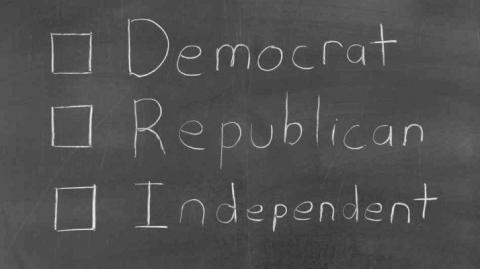Justin Amash
One of the youngest U.S. Representatives and Chairman of the House Liberty Caucus, Justin Amash is among themost independent members of the House GOP and strives to distance himself from party groupthink. The New York Times noted in 2011 that Amash, “has not voted with the majority 25 percent of the time, the most of any House Republican.”
He was recently criticized by GOP strategist Karl Rove, asserting Amash's “staunch libertarian stances on legislation as antithetical to tackling issues in Washington.” On top of this, Amash is one of the most transparent members of the House, consistently explaining his votes to the public along with personally engaging them through his social media accounts.
Amash stands strong in opposing SOPA, PIPA, the NDAA, and drone strikes on Americans as well as war in the Middle East. Amash introduced an amendment to defund the NSA's controversial domestic surveillance programs. The amendment, however, was rejected on the House floor earlier this week.
Bernie Sanders
The longest serving independent in U.S. Senate history, Senator Bernie Sanders from Vermont is one of the biggest opponents of the increased security state and an outspoken critic of corporate greed.He supports GMO labeling, universal healthcare, same-sex marriage, and a woman's right to choose. Sanders has consistently voted against and introduced legislation to amend the Patriot Act and the National Defense Authorization Act, and has criticized recent NSA spying revelations.
Sanders also supports the DISCLOSE Act, which would make the campaign finance system more transparent and prevent foreign influenced U.S. corporations from influencing U.S. politics, and calls for the reversal of the Citizens United decision which considers corporations as people.
Wendy Davis
Texas state Senator Wendy Davis (D-Fort Worth) was recently in the spotlight for her filibuster of the Texas Legislature’s push to end nearly all abortions in the state. Davis spoke to Rachel Maddow about what she believes is the greatest political issue in Texas: election laws like redistricting and hyper-partisan primaries that have ensured that there aren’t general elections that represent the citizens of Texas.
“I think that most Texans find themselves in the middle, they don’t align with far right or left politics and they want to see us serving them in that place in the middle,” said Davis.
Angus King
Angus King, the socially liberal and fiscally conservative independent senator from Maine, is a co-sponsor of the recently introduced 21st Century Glass–Steagall Act, which aims to break up Wall Street's too-big-to-fail banks by separating traditional banking activity from riskier investment services.
King has stated that he wishes to serve as a bridge between the two parties. He opposes Citizens United and is a strong advocate for debt and deficit solutions, believing that debt is the most significant threat to the United State's national security.
Ron Wyden
Serving as a Democratic senator from Oregon since 1996, Wyden characterizes himself as an “independent voice for Oregonians and the nation” and is a strong supporter of health care reform, consumer protection, and governmental transparency.
Wyden recently helped introduce a bill that would put an end to the secret FISA courts ruling on controversial government surveillance programs and was the only Democrat to speak in favor of Rand Paul's recent drone filibuster.
Wyden is also a co-sponsor of the “Follow the Money” campaign finance reform legislation, which hopes to bring transparency and consistency to campaign finance abuses and “address the influx of anonymous federal election spending.”
Evan Falchuk
Evan Falchuk recently announced his candidacy for governor of Massachusetts, a state where over 52 percent of voters are independent or unaffiliated.
Falchuk, founder of the United Independent Party, is running on a platform of socially progressive and fiscally sensible solutions and calls for a “functioning, multi-party democracy.”
Funding job training programs, anti-poverty relations measures and public health issues are among core issues he hopes to tackle, but his first action, should he be elected, will be to change Massachusetts campaign finance laws, which grossly favor the two party system.
Jesse Ventura
Ventura served as Governor of Minnesota from 1999 to 2003 and is on record stating his desire to run in the 2016 presidential race as an independent candidate as long as he can garner national ballot access in all fifty states and have the ability to participate in the presidential debates.
Ventura has described the Republican and Democratic parties as “monsters that are out of control,” who are concerned “only with their agendas and their pork.”
Recently, he went on record to declare that he no longer supports third party movements and instead advocates that all political parties be abolished. Fiscally conservative and socially liberal, Ventura has been an outspoken critic of unconstitutional wars, the use of torture, the TSA, and self-serving corporate media agendas.
Thomas Massie
Considered one of the few remaining true constitutional conservatives remaining in Congress, Massie received a Cumulative Freedom Index Score of 100 percent, which is a congressional scorecard based on the U.S Constitution.
Massie is known for charting his own path and perhaps most famously broke from the majority of his party by opposing the re-election of Speaker of the House John Boehner, instead casting his vote for Republican congressman Justin Amash of Michigan.
He recently introduced two amendments to the House Defense Appropriations Act that would require congressional approval for taxpayer funds to be used for “military or paramilitary purposes in Syria and Egypt.” The amendments were approved by the House in an unanimous vote earlier this week.
Susan Collins
Susan Collins shows a stronger than average independence from the party line, voting with the Republican Party only 61.5 percent of the time, ranking 46 among 46 Senate Republican members as of June 13, according to Open Congress. Collins was also reported to be the most bipartisan Senator in 2011. Between 1997 and 2013, Collins missed 0 of 5,261 roll call votes.
Abel Maldonado
This Republican from California was the 48th lieutenant governor of the state and before that served as a state senator. Maldonado submitted Proposition 14 in 2010, which enacted the top two primary system in California and in May, he announced he will seek the Republican nomination for the 2014 California gubernatorial election.
IndependentVoice.org, a statewide organization representing the interests of California's 3.4 million independent voters, announced its endorsement for Maldanado in 2010 stating:
“Abel Maldonado proved his independence when he took on both parties -- including his own -- to place Prop 14 on the ballot. That's the kind of tough and nonpartisan leadership that independent voters are looking for.”

